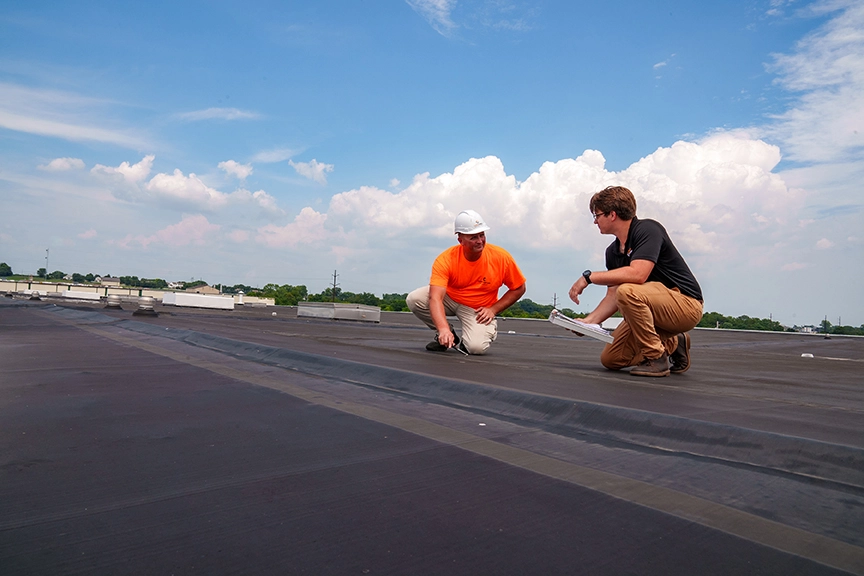Installing Roof Equipment? Consider Hiring Roofing Professionals Along with Your Subcontractors
Commercial roofs often host a variety of equipment and systems to meet the operational needs of the commercial facility or factory underneath. The specific type of equipment installed on a roof can vary based on the nature of the business, the building’s function, and its size. The most common types of equipment installed on commercial roofs include HVAC units, roof-top solar panels, communications equipment, cooling towers, roof access hatches and ladders, skylights and roof windows, and lighting protection and fire suppression systems.

It’s important to note that the type of equipment installed on a commercial facility will vary widely based on the industry, the specific needs of the business, and local building codes and regulations. Additionally, proper installation and maintenance of this equipment is crucial to ensure the longevity and performance of both the commercial equipment and the roofing system.
Many times, facility managers are trying to save money and in doing so, they may hire a subcontractor to install the rooftop equipment, rather than engaging with a roofing professional. But, even if you have hired subcontractors to perform the equipment installation work, it’s imperative to engage with a qualified roofing professional to serve as a consultant.
Engaging subcontractors with roofing professionals when installing new equipment on a roof is important because they have specialized knowledge and experience in working with various commercial building roof types, such as single-ply roofs, spray foam, metal roof coating, and shingle roofing. When installing new equipment, such as HVAC units, solar panels, or other mechanical systems, it’s crucial to ensure that the installation process does not compromise the integrity of the roof. Trained roofing professionals can assess the structure and make informed decisions to prevent issues like a roof leak repair or structural damage; engaging with a qualified roofing contractor on your next roof project will also result in these benefits:
Having the Right Equipment: A roofing expert has all the right tools needed for a roofing job. Even if they aren’t performing the work, they can advise subcontractors regarding what tools to use. If you don’t choose to work with a professional contractor, your subcontractors may not know what tools to use and will be forced to improvise.
Possessing Experience: Understanding that a contractor has the requisite experience is essential. Without having worked on previous roofing projects, it’s hard to know whether a job will turn out as it should. But when you involve a roofing professional, you can have confidence in the type of work or consulting services they provide to you. Experienced contractors exercise quality workmanship. It is easy to know whether you can trust a contractor by taking time to look at their portfolio and to research if they have positive reviews.
Saving Money: You might think that working with a professional roofing contractor is too expensive. Sure, you will spend some additional money on the front end, but think of this as an investment, as opposed to a potential costly future roofing emergency.
Preserving a Roof Warranty: Many roofing systems come with warranties, and improper installations of any kind—including rooftop equipment—can void these warranties. Roofing professionals understand the specifications and requirements outlined in roofing warranties. By engaging them in the equipment installation process, you can verify that the new equipment is being integrated correctly, preserving the warranty and protecting your roof investment.
Ensuring Seamless Integration: Roofing professionals will work closely with subcontractors to make certain the new equipment integrates seamlessly with the existing roof structure. This includes considerations for proper flashing, waterproofing, and other elements critical to maintaining a roof’s integrity. A well-coordinated effort between roofing professionals and subcontractors will result in a more effective and durable installation.
Complying with Building Codes: Roofing equipment installations must comply with local building codes and regulations. Roofing professionals are familiar with these codes and can verify the installation meets all necessary requirements. Failure to comply with codes can lead to legal issues and may result in costly corrections in the future.
Minimizing Risk: Installing new equipment on a roof involves certain risks, including the potential for leaks, structural issues, or damage to the roofing material. Roofing professionals are trained to identify and mitigate these risks. Their involvement can help prevent costly mistakes and ensure that the installation is completed safely.
Ensuring Efficient Project Management: Collaboration between roofing professionals and subcontractors streamlines the project management process as well. Effective communication and coordination between these parties can lead to a more efficient installation, reducing the likelihood of delays and making sure the project stays on schedule.
Creating Long-Term Durability: Roofing professionals understand the long-term implications of roof equipment installations on a roof’s durability. They can provide insights into the best practices for securing equipment without compromising the roof’s structural integrity. This focus on long-term durability is essential for the overall performance and lifespan of both the roof and the installed equipment.
Promoting Safety: Professional roofing companies have invested in equipment, safety gear, and risk management training to ensure they can perform their work safely. By hiring a professional roofing contractor, you can avoid costly injuries and allow the experts to do the work or to properly consult subcontractors on how to perform the job. Subcontractors and professional roofers should also be insured to protect the facility from liability.
By engaging subcontractors with roofing professionals during the installation of new roof-top equipment, facility managers can rest assured the project will be executed with expertise, complies with building codes, preserves warranties, minimizes risks, and results in a durable and well-integrated system. This collaborative approach will contribute to the overall success of the project, preventing the need for an emergency roofing repair, and preserving the long-term performance of the roofing system.